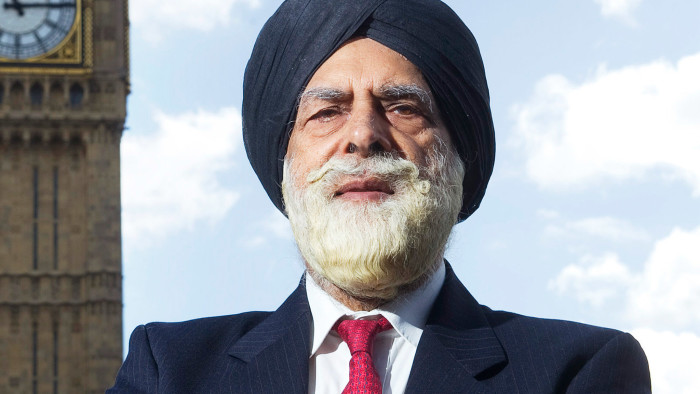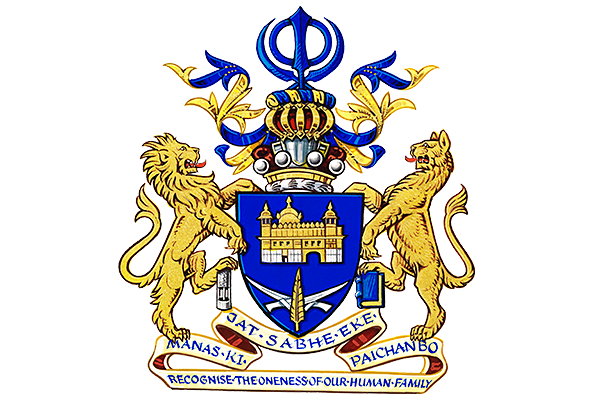Interview: Indarjit Singh, Crossbench life peer

Roula Khalaf, Editor of the FT, selects her favourite stories in this weekly newsletter.
A cartoon depicting a meeting of international human rights leaders hangs above Lord Indarjit Singh’s tidy desk in the House of Lords. In it, a group of international characters are asked their opinions on the shortage of food in the rest of the world. A man from “Arabia” says: “What is opinion?” The response from the US is: “What is the rest of the world?” The African asks: “What is food?” and the European questions: “What is shortage?”
“I would have loved to have been a cartoonist,” says Lord Singh, 83, who has worked for decades as an advocate for human rights and interfaith issues. “A cartoonist . . . can say in one drawing what I can’t say in a lengthy article.”
Walking through the corridors of the House of Lords, past tapestries and paintings illustrating centuries of British history, Lord Singh quotes from the Koran, the Bible, the Torah and his own Sikh holy book, the Guru Granth Sahib. On his desk is a glass crystal representation of the Sikh Khanda, which symbolises the integration of the spiritual and temporal — the cornerstone of much of his life’s work.
“We look to differences to say we are better and many religious people create wars of superiority. But the overlapping principles of commonality should be focused on instead of the differences,” he says. “Laws can control the boundaries of bad behaviour but they do not create good behaviour,” he adds. “Religion and ethics teach us how to behave as human beings.”
In 1987, Lord Singh co-founded the Inter Faith Network for the UK to promote communication and co-operation, and he has often been consulted by government leaders on race relations. He set up the Network of Sikh Organisations in 1995 and co-ordinated spiritual care of Sikhs in UK prisons and hospitals. Back in the mid-1980s, he had founded The Sikh Messenger, which he continues to edit, and for more than 30 years he has been a regular contributor to Thought for the Day on BBC Radio 4. In 2011, he was made a crossbench life peer, becoming the first member to wear a turban.
Putting human rights at the forefront of politics is central to his work and he feels strongly about the plight of Syrian refugees. “Britain has a moral duty to welcome more refugees,” he says. “If we can’t bring the Syrian refugees into our country and welcome them, then how can we call ourselves human beings?”
The growth of extremism is another concern and he blames incorrect interpretations of the Koran for some of the violence. While he admits we might need to give up some privacy to prevent terrorist attacks, he stresses the importance of protecting religious freedom. “There are more religious freedom difficulties in India and Christians and Muslims are having a tough time,” he says. “When it comes to human rights and the acknowledgment of different faiths, Britain is a bit better than everyone else.”

The peer was born in 1932 in Rawalpindi, now in Pakistan, and moved to the UK with his family when he was a baby. His father, a doctor, had difficulty finding a job in a British hospital and had to build his own practice. Lord Singh, who graduated with a first-class degree in engineering from Birmingham University, says he was turned down by the Coal Board to be a mine engineer because he was told the miners “wouldn’t like an Indian manager”. So he left the UK to work in India, only to encounter more prejudice.
“When I worked as a mining engineer, I saw greater discrimination in India and I was surprised to see that people of different castes didn’t eat together in one canteen,” he says. “It’s something in human nature to want to feel superior to another. I call it the law of humans.”
For more than a decade, he was prevented from visiting India because he criticised the attack on the Golden Temple in 1984. Prime minister Indira Gandhi ordered the army to storm the temple and remove Sikh separatists with co-ordinated raids on gurdwaras (Sikh temples). Officially, about 400 pilgrims died but local reports suggest the figure was in the thousands. Four months later, Gandhi was assassinated by two Sikh bodyguards, sparking anti-Sikh rioting.
Life lessons
What is the most valuable lesson you have learnt?
Expect the unexpected and deal with it.
Do you have any regrets?
My only regret is that humans have not made that much progress in the past 20 to 30 years. When it comes to human rights, there are still so many problems: children in bad care, mistreatment of the elderly and violence against women. Social [and health] services treat spots and sores but there has been no treatment of the underlying lack of responsibility.
Any advice for changing careers?
If it’s not going where you want, then change. Change invigorates. Every change I made, I have learned something.
Are you thick-skinned?
I have learned to ride through petty criticisms and name calling. But I am not that thick-skinned. I feel the personal needs of others.
He argues for broader religious education in UK schools. “In general, British society is more tolerant, but a lot of it is superficial,” he says. “People are more polite and less confrontational to other cultures and there is more knowledge.”
He was saddened by the row about alleged anti-Semitism in the Labour party. “I feel there is a whole language used to skirt over issues and smear people,” he says. “The Labour party is making language mistakes. Any reference to Hitler is a stupid choice of words.”
Societies should allow free practice of customs as long as they do not infringe on human rights, he says. Currently, he is advising plaintiffs in legal challenges to French laws by pressing for Sikhs to be allowed to wear turbans in school.
However, he opposes religious customs that are disrespectful to women. Recent advice from the Blackburn Muslim Association that women should not travel on long journeys without a male chaperone is an infringement of women’s rights, he says.
Lord Singh did not set out to be a vocal leader but found himself moved to speak out. When he returned to the UK, mining had taken a downturn and he worked in civil engineering. He began to write and publicise his views about Sikh and interfaith issues until that became his main career. Now working in the House of Lords, he is a respected leader in his community, the UK and global human rights organisations.
“I wouldn’t claim to be a leader because in the Sikh faith we are all leaders,” he says. “Developing a role in a community is about one’s actions and that is what people respect.” Like many small ethnic communities, he says Sikhs “have a lot of practice in trying to survive”.
Comments